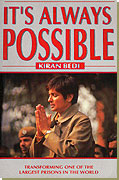It’s Always Possible

Motivation, persistence and perseverance are the distinct traits of determined and dedicated individuals who can make things happen. It’s always possible, even when the task is awesome – transforming the mindset of human beings.
Located in India’s capital, New Delhi, Tihar is one of the largest prisons in the world. Within a prison complex of over 200 acres are housed over 9,700 inmates – men, women, adolescents, children; Indians and foreigners. They comprise unconvicted alleged offenders, convicts and remandees. Tihar was a limping, languishing institution, condemned by the media, and its inmates were isolated from the community, exploited, used and abused, yet ‘housed’.
Dr Kiran Bedi was appointed Inspector General of Tihar Prison in 1993. She brought about fundamental changes, giving a human face to the administrative structure and creating an exemplary system covering every possible aspect of prison management. The whole objective was to collectively and individually manage the transition from a moribund system to a responsive and sensitive administration. Hence her efforts unfolded the process of reformation involving prison administration, prisoners and the community, toward one common goal – Correction through a collective approach.
Dr Bedi’s account is enhanced by input from the prisoners themselves, expressing their feelings in letters and sketches, in petitions and poetry. This book is a graphic portrayal of an holistic process of conversion, a metamorphosis from criminality to humanity, achieved within a restrictive legal framework.
Oct 1999, 400pp
Paperback, 231 x 155 mm
Non-fiction
ISBN 0 9585805 3 7
RRP $aud 27.95
ISBN-13 9780958580533
The Author
Dr Kiran Bedi was the first woman police officer in India to become Inspector General of Prisons, when she was put in charge of Tihar, to administer the predominantly male prison, the largest prison in the Asia-Pacific region. Her experience and expertise as a police officer include 26 years of tough yet responsive and interactive policing in different functions throughout India – District policing, Police administration, Traffic control, Narcotics control, and Anti-terrorist operations. Subsequently, she was central to the radical reforms in Tihar, where the focus before she took control, had been merely keeping people locked away from society. She achieved the reforms through her radically humanitarian approach to managing such an institution.
Having earned the reputation of a police officer with a difference, she has represented India at the United Nations, in USA, European and Asian forums on drug abuse, drug trafficking, prison reform, and women’s issues. Recipient of various awards and honours, she has received the Police Medal for Gallantry; the Norway-based Asia Region Award for Work in Prevention of Drug Abuse; the prestigious Ramon Magsaysay Award in 1994, referred to as the Asian Nobel Prize, and in 1997, the Swiss-German Joseph Beuys Award for Holistic and Innovative Management.